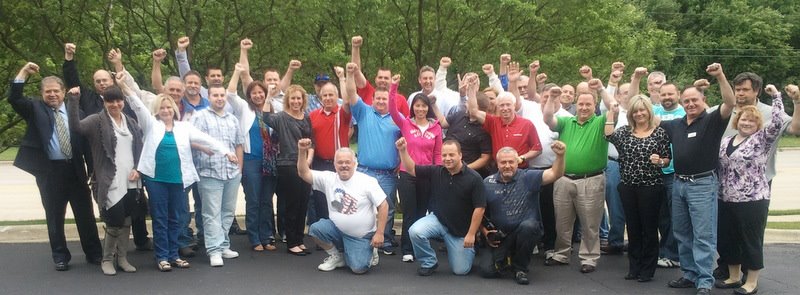|
"If you are not attending Totally Booked University, you better pray your competition isn't, either."
- Charles Cannistraci, Blairstown, NJ |
"Awesome class! Worth every penny, plus some! Jeff Cross is way ahead of the curve. Thanks."
- Scott Smith, Meadville, PA |

Jeff Cross is the editorial director of Cleanfax and creator of Totally Booked University. Contact him via e-mail (click here) or by telephone at (740)973-4236. Besides marketing workshops, check out the details for private IICRC classes and seminars here. What you will learnBusiness building strategies - Targeting an untapped market - Creating a referral program - Simplified direct mail campaigns - Mass marketing without breaking your advertising budget - Insurance agent and adjuster marketing - Getting more restoration jobs - Social media marketing (Facebook, etc) - How to avoid common website mistakes - Search engine optimization - Website design - Internet coupon strategies - And many more marketing tools!
Click here for more about what you will learn and how you will benefit from a TBU workshop. Attendee Reviews: "I wanted to take this time to express to you how much I truly enjoyed the seminar you organized in Tampa. I've attended a lot of seminars over the years. This has to be the BEST! From beginning to end. The organization,the speakers well put together. Jeff I learned a lot, lots of information I'll be able to use everyday. Thank you from the bottom of my heart for everything." - Bobby Thomas, B&B ENTERPRISE, Orlando, FL "Just wanted to take a minute and thank you for your class. I thought it was very precise and informative. Thoroughly enjoyed the presentation as well as the take home information. Would definitely recommend this class to others. Thanks again." - Jo Lucas, Philadelphia, PA "If you are not attending Totally Booked University, you better pray your competition isn't, either." - Charles Cannistraci, Service One, Blairstown, NJ "In all honesty, we usually avoid these seminars like the plague. A lot of pushy sales and ideas that really won't benefit your business at all. Not at Totally Booked University!" - Maria Cox, Delaware, OH. "I enjoyed the class and picked up a few nuggets of info that I really needed. I had so much of the info rolling around in my head I had to get up at 2 a.m. last night and go through the rest of the presentation on the thumb drive." - Barry Click, Harrison, VA "Totally Booked University is an amazing seminar! Jeff's teaching style is outstanding. He shares great information, makes it fun, interactive, and easy to understand." - Jim Minter, Colorado Cleanup Services, Denver, CO "It's mind boggling trying to understand how to reach your market with Social Media and directory searches! Just wanted to say 'thank you' for putting together such a great workshop. I walked away with tons of ideas and some great tools. Plus, I haven't laughed that hard in a long time! Thank you, Jeff Cross, for clearing out some of my brain cobwebs!" - Regina Coates, Restoration24, Raleigh, NC Pataskala Cleaning Best Steam Carpet Cleaner Pataskala OH |

"Hi, I'm Lizzie, and I'm the star of lots of Marketing Zoo videos, infographics, postcards and stuff. And I will help you get carpet cleaning customers. I will speak to those who need your restoration services. You need my help!"
Here' s how to get me A monthly subscription service that gives you everything you need for your website and social media sites. Avoid website frustrations with images, videos, fresh content each month - and much more! Visit www.MarketingZoo.com for complete information. Your online marketing efforts are now solved. Why attend a TBU workshop? It's simple! You want better marketing tools and methods to find more customers and increase profits!Although many carpet cleaning and disaster restoration companies are successful, business owners are constantly looking for progressive methods to build their companies, get more customers and increase profits.
A TBU workshop is for the serious, aggressive and forward-thinking entrepreneur who really wants to find new customers and increase profitability. From your business card to your referral programs to social media and Internet marketing — and much, much more — this event provides you with the marketing tools you need. Remember that full registration includes the invaluable 2 GB computer drive with all the marketing tools you need to build your business. This computer drive is handed to you at the event. You will not be asked to sign up for coaching or asked to purchase other marketing tools at any TBU event. Guaranteed. A TBU workshop is not a pep talk or a sales pitch
Ask anyone who has attended. Read the testimonials below. When you sign up and attend a TBU workshop, be prepared to receive practical, real-world advanced marketing tools that will get you more customers right away. We will work on your website. We will help you with your search engine optimization system. We will work on your social media campaigns (Facebook, Twitter, etc). Referral programs, Internet and print coupons, finding more customers and much more is part of the program. Keep investigating.
This is the official technical cleaning training and marketing training website of Jeff Cross, executive editor of Cleanfax magazine. Private classes available. We help you with all your carpet cleaning marketing, disaster restoration and water damage marketing, contract cleaning marketing efforts and provide you with valuable business tips! Carpet Cleaning Marketing Courses & Training Workshops, Cleaning Marketing Information, Restoration Marketing Information, Cleaning Business Tips, Cleaning Business Management, Cleaning Service Marketing, Commercial Cleaning Marketing, House Cleaning Marketing, Janitorial Marketing, Office Cleaning Marketing, Carpet Cleaning Classes, Carpet Cleaning Seminars, Upholstery Cleaning Seminars, IICRC classes, Color Repair Seminars, Spot and Stain Removal classes, Internet Marketing, Social Media Marketing. Bad NFL Lip Sync. The need for progressive, aggressive marketing systemsEven if you aren't able to attend a TBU carpet cleaning or disaster restoration marketing workshop, you can take advantage of our "Hot Marketing Tips" blog. Use what works with your company and your own personality and you can even share your own comments and thoughts as well.
Aggressive entrepreneurs are always looking for strategies and tips to grow their business. There are hundreds of strategies, some big and some small, that you can use. Pick a few that you like and don't give up on them. It takes time to grow your cleaning and restoration company. Homeowners and those who need quality carpet cleaning and housecleaning tips, visit http://www.cleaningoutpost.com/ and check out the online articles, cleaning tips, carpet cleaning advice and how to take care of your home.
|
Articles To Help You With Your Business
The Perils of Social Media Reviews
by Jeff Cross, executive editor, Cleanfax
“I hate Angie’s List!”
“I had a bunch of Yelp reviews but now they are gone.”
“Facebook is a waste of time, and so is Twitter.”
Depending on the group of business owners discussing social media, the complaints can go on and on. While some may feel that the pure social sites like Facebook are a waste of time, others strongly dislike the review sites, such as Angie’s List and Yelp.
Why? Because, once in a while, you get a negative review and it seems as if the world is coming to an end.
In this issue of Cleanfax, you will see a very informative article by Steve Marsh in his Single Truck Success column on the topic of tapping into the power of social review sites. That’s a proactive approach to getting good reviews and taking advantage of what your happy customers say about your company and the services you provide.
But are you “proactive” enough? Do you value reviews (aka testimonials) and work hard to get them? I’m not talking about just on your own website. It’s pretty easy to get someone to say something about your company and copy those comments to your website — and everyone should do that. It’s another thing to get them to go to Yelp and Angie’s List, as members, to give you a shining review.
Some wish to avoid Yelp and Angie’s List because of those occasional negative reviews. You get one, you want to delete it, but that’s not an option. The unhappy customer can remove a review, but I guarantee that won’t happen unless you fix the problem and make that customer happy once again.
This brings up a pretty important point. Are “bad” reviews really bad? Remember that consumers that look at reviews before making a purchase are actually pretty savvy. They know how the system works. They know that a company that has only stellar reviews pasted all over the Internet might not have received those reviews honestly.
But a company that has a “four out of five” rating, or maybe a minor complaint one out of 10 times, is most likely one that is a good choice to use. Consumers know that you can’t please 100 percent of customers 100 percent of the time.
When you get that occasional “bad” review, maybe one that says something about how you could have done a better job or have arrived on time, don’t take it personally. Take it as a challenge. Respond to that review, privately and/or publicly — always choosing your words carefully — and demonstrate how you value your customers and will fix any problem or issue that comes up, no matter who is at fault.
While people like good, quality service, they also like a company that is a problem solver. If you solve problems and fix issues, no matter what they are, the value of any review system you use will help you build your business.
So don’t despair about social media review sites and how they can occasionally give you heart palpitations or give you the urge to throw your computer into the toilet.
Become a member of those social review sites yourself, become a consumer, leave reviews for other companies you do business with and see how the system works.
Missing Pieces
by Jeff Cross, executive editor, Cleanfax
I find it really interesting that some carpet cleaning and restoration companies will spend thousands of dollars in order to get new customers, but when they have them, they don''t know what to do with them.
And some huge corporations will spend millions of dollars to get new customers, yet they are clueless on what it takes to make their new customers happy and what it takes to keep them long-term.
I had a recent experience that really drove this point home. I know some of you are starting to think I make this stuff up, but I don't. It doesn't take much effort to find bad service out there.
My experience was with my mobile telephone provider. I've been a loyal customer of this particular provider for many years, so I won''t name the company, but let''s say they weren't quick to sprint to my aid when I needed some help.
I was having some trouble with my wireless Internet card; you know, that little device that plugs into your laptop and, for about $60 a month for the rest of your life, you have reliable online access, from virtually anywhere in the country.
So I go to the local store I have done business with for years, and presented my problem. I was told I would have to take my device across town to a "service center." I mentioned that I didn't want to go across town, and that I've been thinking of going with a "hotspot" device instead of the type that plugs into my computer.
Basically, I was willing to sign another three-year contract, which is normal anytime you upgrade or buy new mobile equipment. My monthly bill with this company has been a steady $225 per month for years, since I have two mobile phones and the aircard on the account.
I was told, "Well, you aren't up for an upgrade for another year or so." I said, "That's OK, I just want to do something to fix this problem; do you have any hotspot devices?"
Translation: "I''m willing to spend more money with you, just fix my problem, please. Here is my credit card."
And the clerk (I think it was really the store manager) said, "I don''t think we can help you today." Those were words I didn't really understand, because when I was running my own carpet cleaning and restoration company, I fixed each and every one of my customer's problems.
Frustrated, I said, "Well, I've been thinking about going over to your competition because I think they have what I need."
The clerk/store manager said, "OK."
So I walked out, called the main number for my mobile telephone provider, and said to shut it all down.
Now my wife and I have new mobile phones and I have my new wireless hotspot.
Some of you might think it wasn't fair of me to threaten going to another provider, but you had to be there and see the expression and attitude of the clerk/manager. I went there for a solution and had my credit card ready… but despite the millions of dollars that company spends to get new customers, they don''t necessarily know how to keep them.
Uh, oh… I guess I''m out of space to share some practical advice here, since I took up this entire page with my complaint. Next month, I will present some rocket-science information on how to keep your customers happy and stay with you — for as long as you want them.
High Aspirations
By Jeff Cross, executive editor, Cleanfax
In business building seminars, the topic of the Pareto principle frequently comes up as a topic of discussion.
For those who aren’t familiar with this principle, it is basically the “law of the vital few,” in that most of your income comes from a small percentage of your client base.
Joseph Juran, a business management consultant, suggested the concept and named it after Italian economist Vilfredo Pareto, who noticed more than 100 years ago that 80 percent of the land in Italy was owned by 20 percent of the population. He also noticed that 20 percent of the pea pods in his garden contained 80 percent of the peas. Good info, especially if you like peas.
Both Juran and Pareto have passed away, but their beliefs are still a mainstay in business today. Not just a concept, but a reality for most
companies across the globe.
As I was reading one of my favorite news magazines recently, I came across an article that didn’t mention the Pareto principle but some statistics jumped out to me that brought it to mind.
It involved something that I do occasionally, but not nearly enough: Fly first class when traveling by air. The article said that 28 percent
of all domestic and international airline revenue came from first and business class seats. But only a mere nine percent of flyers utilized those pricey seats.
The airlines have become lean and mean — there are fewer flights but the ones available are pretty full. Profits have increased because they have dramatically reduced expenses.
Think of your own client base, and the repeat customers you covet. No doubt you could look at your list and compile about 20 percent who repeat often and don’t try to negotiate your prices and have a large amount of cleaning done each time you go to their home.
What about the other 80 percent? On paper, if you were to “fire” them right now, your income would take a small dip but you would have much more time to target and obtain an “A” list clientele, those potential customers out there that have the money and want top quality service.
Now that you have noticed an irregular heartbeat beating in your neck and maybe you are short of breath with the thought of simply throwing away the vast majority of your client base, you don’t really need to do that. What you should do, though, is analyze your company and track where the money is coming from… and concentrate on increasing growth based on the numbers.
Think about this: What attracts the “A” list type of clientele? What do you do that draws them to your company? The best way to find out is to ask them.
A short survey targeted to that 20 percent who provide you with most of your income can give you a huge amount of information on what you should do next in building your business.
Many forget that the solution to business growth is right there: The client database. You can reach out to your best clientele and get their
input. Consider them partners in business development.
Whatever attracted them to your company and motivates them to keep spending money with you is information you must use to keep building your business.
by Jeff Cross, executive editor, Cleanfax
“I hate Angie’s List!”
“I had a bunch of Yelp reviews but now they are gone.”
“Facebook is a waste of time, and so is Twitter.”
Depending on the group of business owners discussing social media, the complaints can go on and on. While some may feel that the pure social sites like Facebook are a waste of time, others strongly dislike the review sites, such as Angie’s List and Yelp.
Why? Because, once in a while, you get a negative review and it seems as if the world is coming to an end.
In this issue of Cleanfax, you will see a very informative article by Steve Marsh in his Single Truck Success column on the topic of tapping into the power of social review sites. That’s a proactive approach to getting good reviews and taking advantage of what your happy customers say about your company and the services you provide.
But are you “proactive” enough? Do you value reviews (aka testimonials) and work hard to get them? I’m not talking about just on your own website. It’s pretty easy to get someone to say something about your company and copy those comments to your website — and everyone should do that. It’s another thing to get them to go to Yelp and Angie’s List, as members, to give you a shining review.
Some wish to avoid Yelp and Angie’s List because of those occasional negative reviews. You get one, you want to delete it, but that’s not an option. The unhappy customer can remove a review, but I guarantee that won’t happen unless you fix the problem and make that customer happy once again.
This brings up a pretty important point. Are “bad” reviews really bad? Remember that consumers that look at reviews before making a purchase are actually pretty savvy. They know how the system works. They know that a company that has only stellar reviews pasted all over the Internet might not have received those reviews honestly.
But a company that has a “four out of five” rating, or maybe a minor complaint one out of 10 times, is most likely one that is a good choice to use. Consumers know that you can’t please 100 percent of customers 100 percent of the time.
When you get that occasional “bad” review, maybe one that says something about how you could have done a better job or have arrived on time, don’t take it personally. Take it as a challenge. Respond to that review, privately and/or publicly — always choosing your words carefully — and demonstrate how you value your customers and will fix any problem or issue that comes up, no matter who is at fault.
While people like good, quality service, they also like a company that is a problem solver. If you solve problems and fix issues, no matter what they are, the value of any review system you use will help you build your business.
So don’t despair about social media review sites and how they can occasionally give you heart palpitations or give you the urge to throw your computer into the toilet.
Become a member of those social review sites yourself, become a consumer, leave reviews for other companies you do business with and see how the system works.
Missing Pieces
by Jeff Cross, executive editor, Cleanfax
I find it really interesting that some carpet cleaning and restoration companies will spend thousands of dollars in order to get new customers, but when they have them, they don''t know what to do with them.
And some huge corporations will spend millions of dollars to get new customers, yet they are clueless on what it takes to make their new customers happy and what it takes to keep them long-term.
I had a recent experience that really drove this point home. I know some of you are starting to think I make this stuff up, but I don't. It doesn't take much effort to find bad service out there.
My experience was with my mobile telephone provider. I've been a loyal customer of this particular provider for many years, so I won''t name the company, but let''s say they weren't quick to sprint to my aid when I needed some help.
I was having some trouble with my wireless Internet card; you know, that little device that plugs into your laptop and, for about $60 a month for the rest of your life, you have reliable online access, from virtually anywhere in the country.
So I go to the local store I have done business with for years, and presented my problem. I was told I would have to take my device across town to a "service center." I mentioned that I didn't want to go across town, and that I've been thinking of going with a "hotspot" device instead of the type that plugs into my computer.
Basically, I was willing to sign another three-year contract, which is normal anytime you upgrade or buy new mobile equipment. My monthly bill with this company has been a steady $225 per month for years, since I have two mobile phones and the aircard on the account.
I was told, "Well, you aren't up for an upgrade for another year or so." I said, "That's OK, I just want to do something to fix this problem; do you have any hotspot devices?"
Translation: "I''m willing to spend more money with you, just fix my problem, please. Here is my credit card."
And the clerk (I think it was really the store manager) said, "I don''t think we can help you today." Those were words I didn't really understand, because when I was running my own carpet cleaning and restoration company, I fixed each and every one of my customer's problems.
Frustrated, I said, "Well, I've been thinking about going over to your competition because I think they have what I need."
The clerk/store manager said, "OK."
So I walked out, called the main number for my mobile telephone provider, and said to shut it all down.
Now my wife and I have new mobile phones and I have my new wireless hotspot.
Some of you might think it wasn't fair of me to threaten going to another provider, but you had to be there and see the expression and attitude of the clerk/manager. I went there for a solution and had my credit card ready… but despite the millions of dollars that company spends to get new customers, they don''t necessarily know how to keep them.
Uh, oh… I guess I''m out of space to share some practical advice here, since I took up this entire page with my complaint. Next month, I will present some rocket-science information on how to keep your customers happy and stay with you — for as long as you want them.
High Aspirations
By Jeff Cross, executive editor, Cleanfax
In business building seminars, the topic of the Pareto principle frequently comes up as a topic of discussion.
For those who aren’t familiar with this principle, it is basically the “law of the vital few,” in that most of your income comes from a small percentage of your client base.
Joseph Juran, a business management consultant, suggested the concept and named it after Italian economist Vilfredo Pareto, who noticed more than 100 years ago that 80 percent of the land in Italy was owned by 20 percent of the population. He also noticed that 20 percent of the pea pods in his garden contained 80 percent of the peas. Good info, especially if you like peas.
Both Juran and Pareto have passed away, but their beliefs are still a mainstay in business today. Not just a concept, but a reality for most
companies across the globe.
As I was reading one of my favorite news magazines recently, I came across an article that didn’t mention the Pareto principle but some statistics jumped out to me that brought it to mind.
It involved something that I do occasionally, but not nearly enough: Fly first class when traveling by air. The article said that 28 percent
of all domestic and international airline revenue came from first and business class seats. But only a mere nine percent of flyers utilized those pricey seats.
The airlines have become lean and mean — there are fewer flights but the ones available are pretty full. Profits have increased because they have dramatically reduced expenses.
Think of your own client base, and the repeat customers you covet. No doubt you could look at your list and compile about 20 percent who repeat often and don’t try to negotiate your prices and have a large amount of cleaning done each time you go to their home.
What about the other 80 percent? On paper, if you were to “fire” them right now, your income would take a small dip but you would have much more time to target and obtain an “A” list clientele, those potential customers out there that have the money and want top quality service.
Now that you have noticed an irregular heartbeat beating in your neck and maybe you are short of breath with the thought of simply throwing away the vast majority of your client base, you don’t really need to do that. What you should do, though, is analyze your company and track where the money is coming from… and concentrate on increasing growth based on the numbers.
Think about this: What attracts the “A” list type of clientele? What do you do that draws them to your company? The best way to find out is to ask them.
A short survey targeted to that 20 percent who provide you with most of your income can give you a huge amount of information on what you should do next in building your business.
Many forget that the solution to business growth is right there: The client database. You can reach out to your best clientele and get their
input. Consider them partners in business development.
Whatever attracted them to your company and motivates them to keep spending money with you is information you must use to keep building your business.





